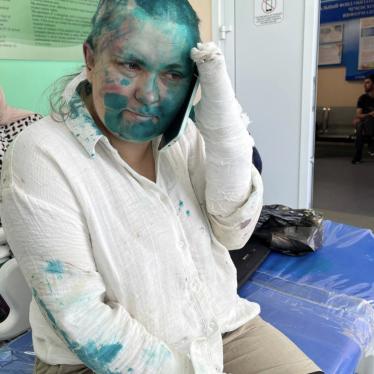Russian law enforcement officials have used ill-treatment to coerce confessions from suspects in the October 13 armed attacks in the Northern Caucasus city of Nalchik, Human Rights Watch said today.
During a fact-finding trip to the region, Human Rights Watch researchers collected convincing evidence that at least eight persons who were detained on suspicion of participation in the attacks were subjected to ill-treatment that in some cases may amount to torture.
“Russian law enforcement routinely uses torture in its counterterrorism operations,” said Holly Cartner, Europe and Central Asia director for Human Rights Watch. “The illegal practice of fighting one human rights abuse with another must be stopped immediately.”
On October 13, skirmishes broke out between a group of armed men and police and security forces in Nalchik, the capital of the North Caucasus region of Kabardino-Balkaria. The armed men attacked and briefly occupied several police stations and administrative buildings. According to official estimates, at least 135 people were killed in the ensuing battle, including nine civilians.
In the subsequent days and weeks, police and security forces detained dozens of people suspected of having participated in armed attacks. One of the detainees is Rasul Kudaev, a former Guantánamo Bay prisoner whom the United States returned to Russia in March 2004. Local police and security forces arrested him ten days after the Nalchik attacks. Kudaev’s lawyer told Human Rights Watch that her client was severely beaten in detention and could not walk without assistance when she saw him on October 26.
Witnesses said that other detained suspects had told them of prolonged beatings both immediately after their arrest and subsequently in detention at the organized crime department of the police. Several of the witnesses told Human Rights Watch that the detainees had clearly visible injuries that appeared consistent with the reported ill-treatment.
Lawyers for at least five of the ill-treated detainees told Human Rights Watch that the officials who are investigating the October 13 attacks had illegally barred them from representing their clients. The official document removing Kudaev’s lawyer from his case said his lawyer had “previously been a witness in the criminal case [against Kudaev]” and could therefore, under Russian law, not represent him in the proceedings against him.
According to Kudaev’s lawyer, however, she was never questioned but had merely had a conversation with the investigator about her request for a medical examination of her client. In the cases of other detainees, the authorities removed lawyers on similarly spurious grounds.
“Removing these lawyers from their clients’ cases is outrageous,” said Cartner. “Instead of investigating the ill-treatment complaints, the authorities are stripping the victims of their only contact with the outside world.”
Apart from visits with their lawyers, the detainees have been held incommunicado. Even before being removed from the cases, the lawyers complained that officials had hindered their work on behalf of their clients. They said that they were having difficulties gaining access to their clients and receiving information on the charges against them. Three of the lawyers have appealed the decision to remove them from their clients’ cases in court.
The authorities have not opened inquiries into the detainees’ allegations of ill-treatment. In at least one of the cases, however, they have granted the request for a medical examination.







